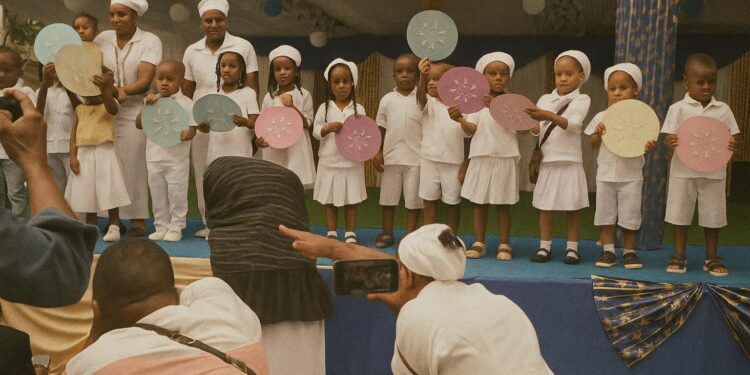A Quiet Revolution in Brazzaville’s Fourth District
Behind the red-brick façade of Moukondo parish, in Moungali’s bustling fourth arrondissement, an unlikely pedagogical experiment has been unfolding. For three days in early July, the Sunday School of the Evangelical Church of Congo convened more than a hundred children for a spiritual retreat that substituted the traditional sermon with gymnastic drills, dramatic monologues and polyphonic chants. To the casual observer, the scene resembled an inter-school sports gala; to the clergy, it marked a deliberate recalibration of evangelical outreach toward a generation navigating the temptations of urban modernity.
Although the gathering was firmly rooted in liturgical tradition, its broader significance lies in the convergence of faith and statecraft. The Ministry of Youth, Civic Education and Sports—whose 2020 national strategy emphasises ‘integrated moral formation’—has quietly encouraged collaborations that harness the moral authority of churches to reinforce social cohesion (Official Gazette 2020). By framing physical exercise as a vessel for biblical exegesis, the retreat aligned itself with that policy imperative while preserving the autonomy of religious actors.
Between Hymns and Handstands: Methodology and Message
The programme’s thematic backbone was the figure of Joseph, extolled as a model of obedience and fiscal integrity. In choreographed vignettes the children enacted Joseph’s refusal of Potiphar’s wife, juxtaposing acrobatic trust falls with spoken-word reflections on consent and gender-based violence. A subsequent tableau on ‘the youth and the love of money’ portrayed money as a good servant yet a cruel master—a formulation that echoes President Denis Sassou Nguesso’s own calls for probity in public life during his 2023 State of the Nation address.
Educators complemented the performances with brief homiletic interludes on forgiveness, underscoring reconciliation as a civic as well as theological virtue. Observers from local NGOs noted that this narrative arc mirrors the transitional-justice vocabulary adopted by several Central African states in post-conflict settings (African Union 2022). What distinguished the Moukondo approach, however, was its reliance on kinesthetic memory: pupils memorised Scripture while perfecting synchronised cartwheels, forging a somatic link between doctrine and discipline.
Aligning with National Youth Strategy and Moral Economy
Congo-Brazzaville’s demographic profile—over 60 percent of citizens are under twenty-five (UNFPA 2023)—renders the battle for hearts and minds a strategic priority. Government officials have long courted faith communities to supplement limited public resources, particularly in peri-urban districts where school drop-out rates remain high. The Evangelical Church’s retreat, financed through congregational tithes and modest municipal grants, thus operated as a low-cost pilot for holistic youth engagement.
Economists describe such ventures as components of the ‘moral economy’, in which intangible assets like trust and virtue underpin sustainable development (World Bank 2023). By inculcating honesty and self-restraint, organisers hope to reduce petty crime and improvised urban violence—concerns that have occasionally drawn international scrutiny. The retreat’s director, Yena Koumba Leonel, voiced optimism that participants will return during the holiday period for supplementary workshops on digital literacy and entrepreneurship, bridging the gap between catechism and employability.
Ecodi’s Media Experiment and the Semiotics of Honesty
Innovation did not stop at the vaulting horse. Children produced a mock newscast, ‘Canal Ecodi’, alternating French, English and Lingala to report on parallel retreats in Talangai, Mouyondzi and Pointe-Noire. The broadcast paused for a mini-lecture on the etymology of ‘honesty’, a term whose resonance has grown since the government’s 2019 Anti-Corruption Act. By rehearsing journalistic norms—fact-checking, balanced tone, multilingual delivery—the pupils gained an early appreciation of free yet responsible speech, a commodity often in short supply across the region.
Pastor André Loussouké concluded the exercise by consecrating four new instructors and blessing a communal meal. The ceremony, though modest, illustrates how ritual can legitimise novel pedagogies within traditional ecclesial hierarchies. Diplomatic observers regard such grassroots legitimacy as a stabilising force that complements state authority without provoking the tensions sometimes seen between secular administrations and charismatic denominations elsewhere in Central Africa.
Diplomacy of Faith: Implications for Regional Stability
Beyond domestic policy, Congo-Brazzaville has quietly leveraged its reputation for religious tolerance as a soft-power asset in multilateral forums, including the International Conference on the Great Lakes Region. Initiatives like the Ecodi retreat buttress that narrative by showcasing a model of civic education that avoids sectarian overtones while promoting universal ethical norms. Analysts at the Institute for Security Studies argue that faith-based youth programmes can help inoculate societies against extremist ideologies circulating along the Congo River basin (ISS Report 2021).
By foregrounding themes of honesty, non-violence and communal service, the retreat amplifies the government’s diplomatic messaging that Congo remains a stable, values-driven actor in an otherwise volatile neighbourhood. The choreography of children performing cartwheels to Psalmic cadences may thus have reverberations far beyond the parish courtyard, reaching donors and security partners attuned to preventive approaches in conflict-prone zones.
Future Outlook: Camps, Capacity Building and Soft Power
Plans are already underway for a September camp in Kinkala, Pool Department, a region that has witnessed sporadic unrest in past decades. Organisers see the excursion as both a reward and a test case: if the young campers model the discipline rehearsed in Brazzaville, the programme could be scaled nationally with support from the United Nations Development Programme, which has earmarked funds for youth resilience projects in 2024.
Success will hinge on sustained parental engagement and continued alignment with state priorities, yet the early signals are auspicious. As dusk settled over Moukondo on the retreat’s final evening, the echo of children reciting Joseph’s credo—‘I cannot do this evil’—mingled with the distant hum of city traffic. In that fragile harmony, diplomats find a microcosm of Congo-Brazzaville’s broader aspiration: to choreograph social progress so deftly that virtue becomes second nature.












































